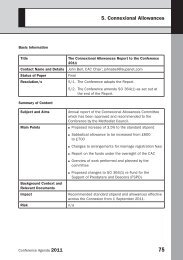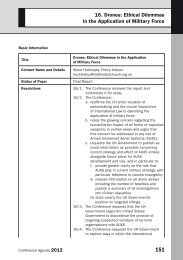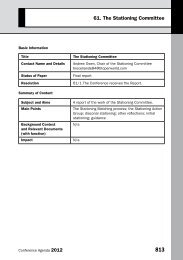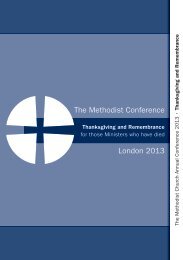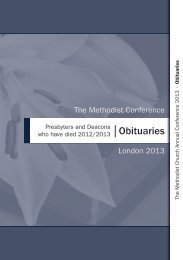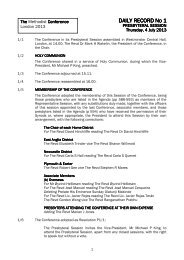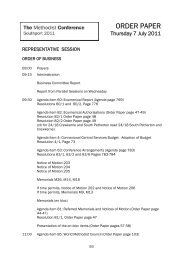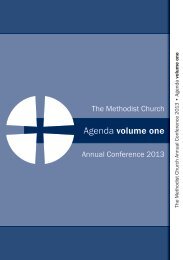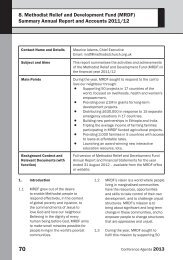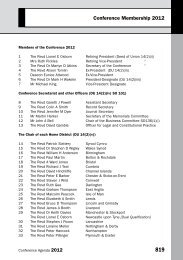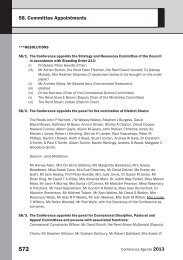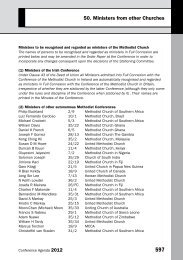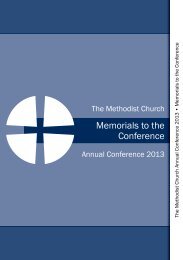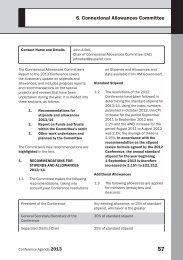Agenda Volume 3 - Methodist Conference
Agenda Volume 3 - Methodist Conference
Agenda Volume 3 - Methodist Conference
You also want an ePaper? Increase the reach of your titles
YUMPU automatically turns print PDFs into web optimized ePapers that Google loves.
57. The Fruitful Field Project<br />
witness. Across the Connexion<br />
over recent years, Circuits have<br />
mapped the size and growth of<br />
Local Churches, and considered<br />
the demography and mission needs<br />
of their communities. Having then<br />
reflected on the stewardship of the<br />
resources in their care, many Circuits<br />
have changed their structures so<br />
that they can better share in God’s<br />
mission with their members, with<br />
those seeking Christ, and with the<br />
world. Such a willingness to reflect<br />
and to change should also mark our<br />
connexional structures.<br />
23 This desire and intention to serve<br />
the Lord and “serve the present age”<br />
resulted in a third priority identified<br />
by the <strong>Conference</strong> in 2008. It is a<br />
priority to structure “the provision<br />
of training and learning resources<br />
so as best to serve the mission of<br />
the Church as a whole. This means<br />
in practice clustering resources<br />
regionally in a connexional and<br />
ecumenical context. It means making<br />
use of the resources for training and<br />
learning available outside the Church.<br />
It necessitates a flexible approach<br />
to boundaries within the Church in<br />
order to make the best use of scarce<br />
resources.” 9<br />
24 This report echoes that priority,<br />
taking seriously the injunction in the<br />
passage in Romans about ardency<br />
of faith, zeal in doing God’s will, and<br />
resolve to serve Christ, here and now.<br />
In the present context this manifests<br />
itself in an owned responsibility of the<br />
<strong>Conference</strong> to challenge and equip<br />
Circuits and Local Churches as they<br />
change and grow as mission-focused<br />
Christian communities of faith, hope<br />
and love. The responsibility to change<br />
and to develop our connexional<br />
structures and resources to meet the<br />
contemporary needs of Methodism<br />
and better serve the Lord is also<br />
taken with the utmost seriousness.<br />
Section C: Our Processes<br />
The origins of The Fruitful Field project<br />
25 In 2010 the <strong>Conference</strong> received<br />
the report Ministries, Learning and<br />
Development. The report noted that<br />
activities in the fields of formation,<br />
learning, training, theological<br />
education, scholarship, research and<br />
development had:<br />
demanded a great deal of the<br />
<strong>Methodist</strong> <strong>Conference</strong>’s attention<br />
over recent years. For example,<br />
proposals regarding the institutions<br />
at which student ministers<br />
undertake initial ministerial learning<br />
programmes were considered<br />
at length by the <strong>Conference</strong> in<br />
2006, and again in 2007.<br />
It is, however, clear that this<br />
area of the Church’s life does<br />
not lend itself to fallow years.<br />
Indeed in the report presented<br />
to the 2006 <strong>Conference</strong>,<br />
Future Use and Configuration<br />
9 Stirring up the Spark of Grace: Connexional Training Strategies, <strong>Agenda</strong> 2008, 1.1<br />
<strong>Conference</strong> <strong>Agenda</strong> 2012 651



